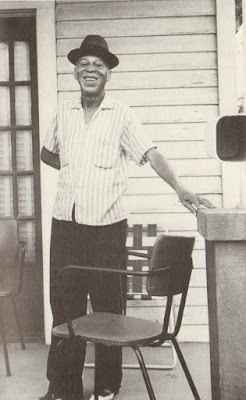Roosevelt Sykes (January 31, 1906 – July 17, 1983) was an
American blues musician, also known as "The Honeydripper".
Sykes was born in Elmar, Arkansas, and grew up near Helena.
At age 15, he went on the road playing piano in a barrelhouse style of blues.
Like many bluesmen of his time, he travelled around playing to all-male
audiences in sawmill, turpentine and levee camps along the Mississippi River,
gathering a repertoire of raw, sexually explicit material. His wanderings
eventually brought him to St. Louis, Missouri, where he met St. Louis Jimmy
Oden, the writer of the blues standard "Goin' Down Slow".
In 1929 he was spotted by a talent scout and sent to New
York City to record for Okeh Records. His first release was "44
Blues" which became a blues standard and his signature song. He soon began
recording for different labels under various names, including Easy Papa
Johnson, Dobby Bragg, and Willie Kelly (for Victor Records from 1930 to 1933).
During this period he befriended another blues musician, the
singer Charlie "Specks" McFadden, and accompanied him on half of the
McFadden's recordings. After he and Oden moved to Chicago, Sykes found his
first period of fame when he signed a contract with Decca Records in 1934. In
1943, he signed with Bluebird Records and recorded with the Honeydrippers,. scoring
a pair of R&B hits in 1945 (covers of Cecil Gant's "I Wonder" and
Joe Liggins' "The Honeydripper").
The following year, he scored one more national chart item
for the parent Victor logo, the lowdown blues "Sunny Road." He also
often toured and recorded with singer St. Louis Jimmy Oden, the originator of
the classic "Going Down Slow."Sykes and Oden continued their musical
friendship into the 1960s.
 In Chicago, Sykes began to display an increasing urbanity in
his songwriting, using an eight-bar blues pop gospel structure instead of the
traditional twelve-bar blues. Despite the growing urbanity of his style, he
gradually became less competitive in the post–World War II music scene. After
his contract with RCA Victor expired, he recorded for smaller labels, such as
United, until his opportunities ran out in the mid-1950s.
In Chicago, Sykes began to display an increasing urbanity in
his songwriting, using an eight-bar blues pop gospel structure instead of the
traditional twelve-bar blues. Despite the growing urbanity of his style, he
gradually became less competitive in the post–World War II music scene. After
his contract with RCA Victor expired, he recorded for smaller labels, such as
United, until his opportunities ran out in the mid-1950s.
Sykes left Chicago in 1954 for New Orleans as electric blues
was taking over the Chicago blues clubs. When he returned to recording in the
1960s, it was for labels such as Delmark, Bluesville, Storyville and Folkways,
which were documenting the quickly passing blues history. He lived out his
final years in New Orleans, where he died from a heart attack on July 17, 1983.
Sykes had a long career, spanning the pre-war and post-war
eras. His pounding piano boogies and risqué lyrics characterize his
contributions to the blues. He was responsible for influential blues songs such
as "44 Blues", "Driving Wheel", and "Night Time Is the
Right Time".
He was inducted into the Blues Hall of Fame in 1999 and the Gennett Records Walk of Fame in 2011.
He was inducted into the Blues Hall of Fame in 1999 and the Gennett Records Walk of Fame in 2011.
(edited from Wikipedia & AllMusic)






















































